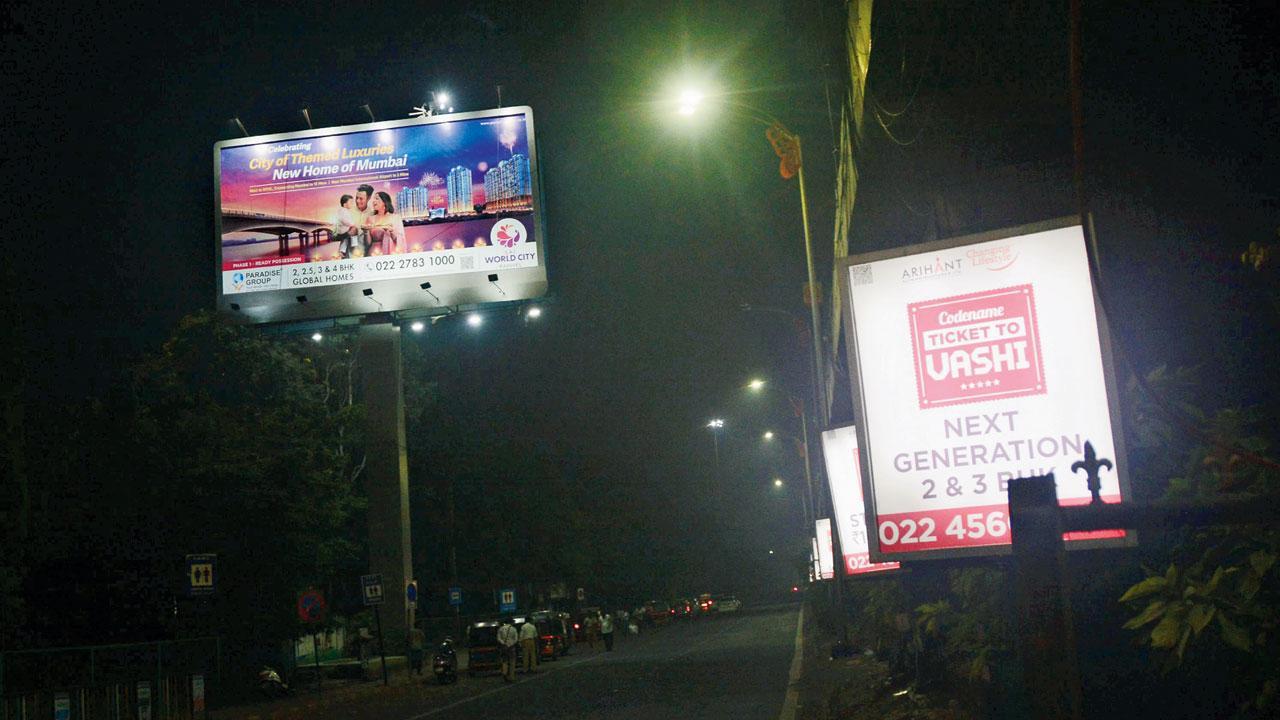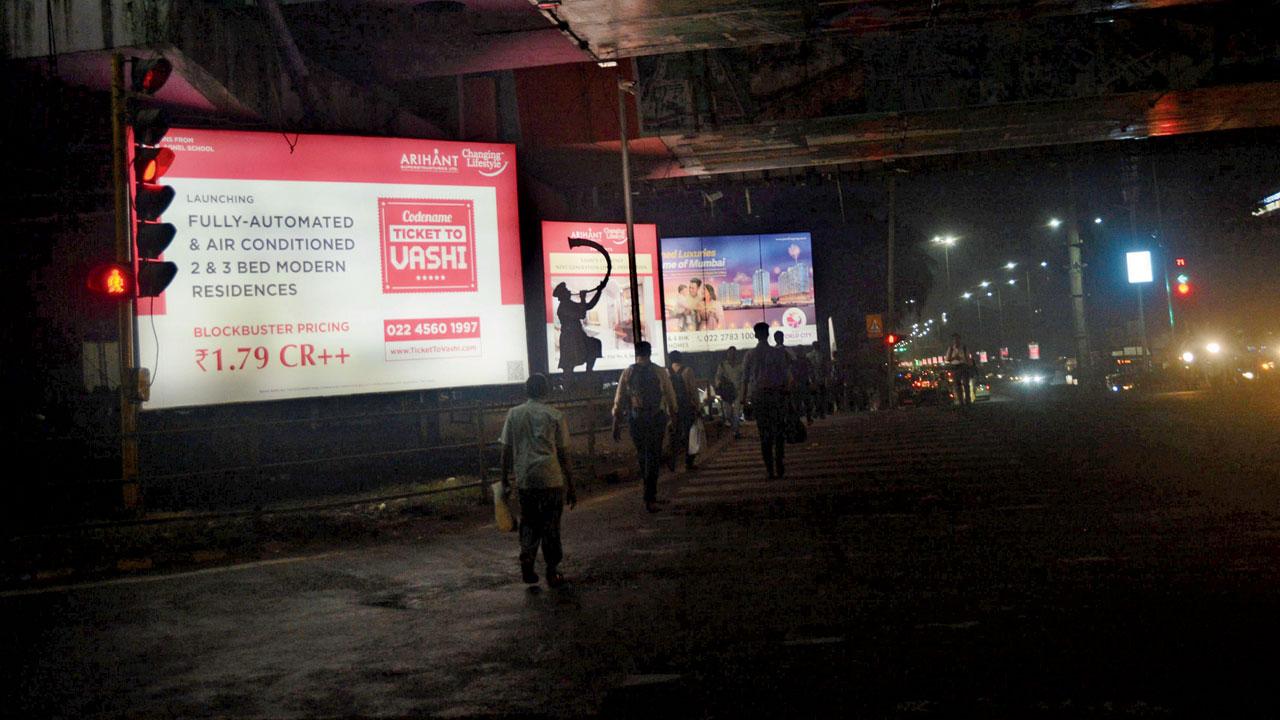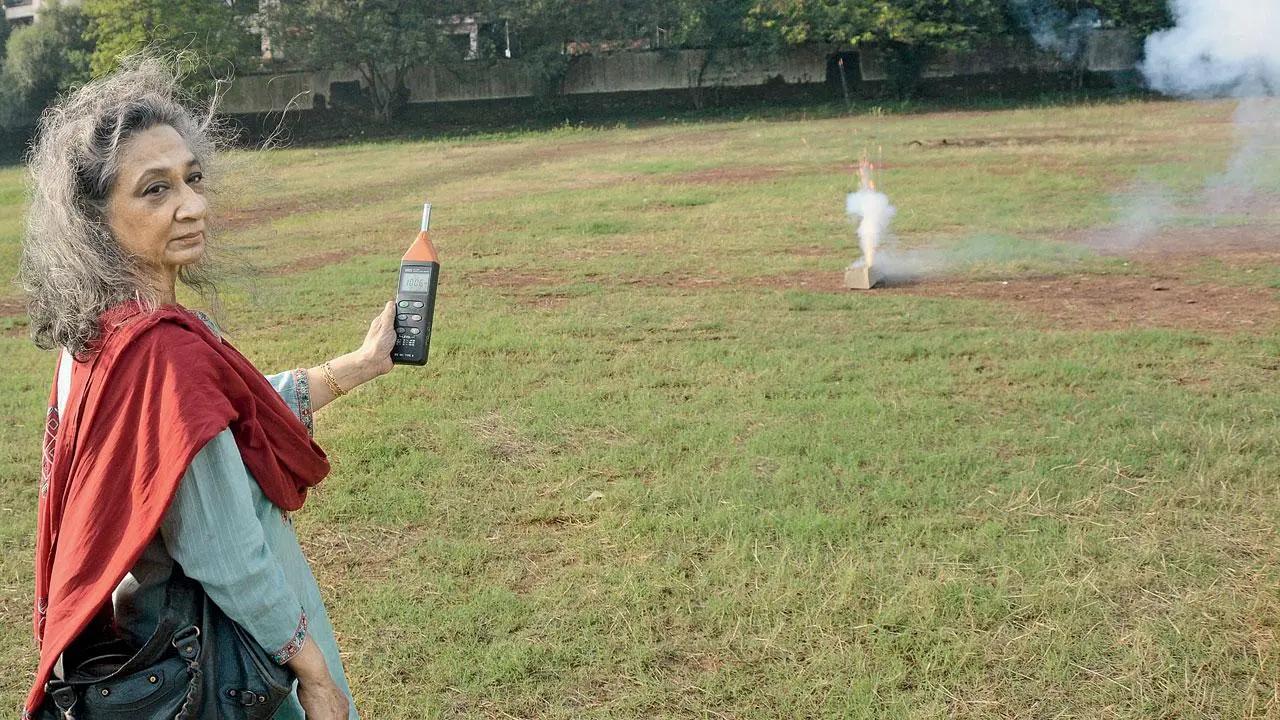Awaaz Foundation requests BMC to come out with stronger draft policy on outdoor advertisements

LED hoardings on the Vashi Highway. File Pics/Sayyed Sameer Abedi
The Awaaz Foundation, an NGO, has raised objections to the Brihanmumbai Municipal Corporation’s Draft Policy Guidelines for Outdoor Advertisements, 2024. It called for a stronger draft policy, which includes setting an illuminance limit for digital hoardings, making reports and recommendations of the BMC-appointed committee public and ensuring regular monitoring of the same. The group has also urged the BMC to conduct a public hearing in the matter.
ADVERTISEMENT
The Awaaz Foundation argues that the policy lacks a scientific basis for its provisions on light pollution—a concern it believes could negatively impact human health and increase road safety risks. The group has suggested that the policy should address crucial factors such as climate, health and safety, and has requested additional public and expert consultations.

The draft policy aims to regulate various forms of outdoor advertising, including digital and lighted signs across private and public sectors. The BMC had called for public suggestions and objections regarding the draft policy, with the deadline set for 5 pm on August 26. Awaaz Foundation highlighted the absence of scientific study on the policy’s potential impacts on light pollution, which could have far-reaching effects on both human health and road safety.
Alleged omissions
In its submission to the BMC, the foundation argued that the proposed guidelines lack sufficient restrictions on illumination levels, colour scales and the use of video displays. These omissions, it claimed, could exacerbate light pollution, known to disrupt sleep patterns, increase stress and even heighten risks of road accidents due to glare affecting drivers’ concentration.
The advocacy group has called for a personal hearing and a public consultation to allow affected citizens to present detailed submissions. It has also requested an extension of the deadline for public comments to ensure thorough community engagement and expert review.
The foundation urged the BMC to incorporate international practices like setting maximum illumination limits and restricting animated content on digital displays. The policy, it suggested, should also include adaptive brightness controls to mitigate light pollution and define specific zones where advertising is permissible, taking into consideration residents’ feedback.
“In most countries, city lighting is regulated, particularly in residential areas and on motorable roads. The lighted billboards of the Ginza in Tokyo and the Times Square of New York are restricted to commercial areas.

Sumaira Abdulali, founder and convenor, Awaaz Foundation
Even New York City, famous for its bright billboards and nightlife, has recognised the harmful impacts of light pollution and, in 2021, passed laws against it by restricting all non-essential lighting during nighttime hours. In NYC, stricter laws are also under review,” stated the letter by Awaaz Foundation. The group emphasised the importance of aligning the policy with broader governmental objectives of enhancing public welfare and environmental protection.
Health impact
The letter further stated, “Humans follow regular sleep patterns of day and night due to regulation of hormones, especially melatonin which promotes sleep in the absence of light. Similar to noise pollution, the adverse effects of light pollution include lack of sleep, disturbance of sleep patterns, irritation, stress, eye strain and other serious health issues. Certain colours on the spectrum are even more comparatively harmful than others, in particular blue light, which makes up one-third of all visible light, and which can even cause eye cancer.”
Scientific panel
Sumaira Abdulali, founder and convenor of Awaaz Foundation, told mid-day: “We proposed the formation of a scientific committee to address this issue. However, we have learned that such a committee already exists. We demanded that their recommendations or reports, if submitted, be made public. We’ve also heard that the committee includes three experts from IIT, which is commendable. However, it’s crucial that the committee also include representatives from the public, NGOs and medical professionals. If such a committee is already in place, the BMC should disclose its details.”
In 2017, Abdulali raised concerns about harshly coloured LED lights installed at Juhu beach. She pointed out, “Unlike air, noise and water pollution, people often do not consider light pollution a significant issue or an issue at all. Sadly, there are no existing laws or guidelines to regulate light pollution. Light pollution can be distracting for drivers and motorists and disrupt people’s sleep patterns. Hence, the civic body needs to include stringent regulations pertaining to the same and also set a maximum illuminance limit for digital hoardings.” The BMC is yet to respond to the foundation’s requests.
Key guidelines of draft policy
>> General provisions: The policy addresses both traditional and digital outdoor advertising, updating terms for previously approved billboards.
>> Safety and aesthetics: The main objectives are to enhance safety, minimise visual clutter and maintain the aesthetic integrity of the city.
>> Digital advertisements: Digital billboards will have a minimum static image display time of eight seconds. The use of video on digital billboards and gantries is prohibited.
Content restrictions: Content deemed offensive, obscene or distracting is banned under Sections 328 & 328(A) of the MMC Act, 1888.
 Subscribe today by clicking the link and stay updated with the latest news!" Click here!
Subscribe today by clicking the link and stay updated with the latest news!" Click here!







